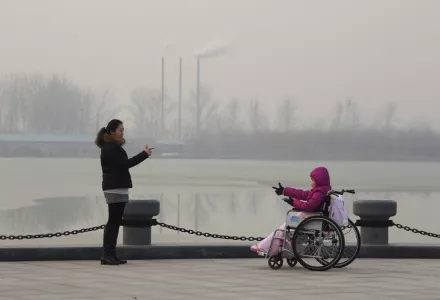
Abstract
China is the world's top carbon emitter and suffers from severe air pollution. We examine near-term air quality and CO2 co-benefits of various current sector-based policies in China. Using a 2015 base case, we evaluate the potential benefits of four sectoral mitigation strategies. All scenarios include a 20% increase in conventional air pollution controls as well as the following sector-specific fuel switching or technology upgrade strategies. Power sector (POW): 80% replacement of small coal power plants with larger more efficient ones; Industry sector (IND): 10% improvement in energy efficiency; Transport sector (TRA): replacement of high emitters with average vehicle fleet emissions; and Residential sector (RES): replacement of 20% of coal-based stoves with stoves using liquefied petroleum gas (LPG). Conducting an integrated assessment using the regional air pollution model WRF-Chem, we find that the IND scenario reduces national air-pollution-related deaths the most of the four scenarios examined (27,000, 24,000, 13,000 and 23,000 deaths reduced annually in IND, POW, TRA and RES, respectively). In addition, the IND scenario reduces CO2 emissions more than 8 times as much as any other scenario (440, 53, 0 and 52 Mt CO2 reduced in IND, POW, TRA and RES, respectively). We also examine the benefits of an industrial efficiency improvement of just 5%. We find the resulting air quality and health benefits are still among the largest of the sectoral scenarios, while the carbon mitigation benefits remain more than 3 times larger than any other scenario. Our analysis hence highlights the importance of even modest industrial energy efficiency improvements and air pollution control technology upgrades for air quality, health and climate benefits in China
Peng, Wei, Junnan Yang, Fabian Wagner and Denise L. Mauzerall . “Substantial Air Quality and Climate Co-benefits Achievable Now with Sectoral Mitigation Strategies in China.” Science of the Total Environment, November 2017
The full text of this publication is available via Science of the Total Environment.


